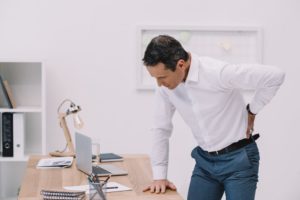
On some days when you have been unusually active or sedentary, you may notice that your hips are mildly sore, maybe even for a few days following. However, this is usually temporary – experiencing ongoing hip pain can be a more serious issue. If your hip pain is severe enough that you’re considering a trip to an orthopedic doctor in Tucker, you may wonder about potential causes. Understanding the potential reasons for your pain may give you some direction as you explain symptoms to your doctor during an initial consultation.
Sprains and Strains
Your hips are connected to many muscles, tendons, and ligaments in your back and lower legs. When you overstretch or tear a muscle or tendon, this is known as a strain. The same happening to a ligament is known as a sprain. In both cases, the soft tissue around your hips is damaged, causing pain during walking. It will likely worsen with activity.
Bursitis
Bursae are small sacs of fluid meant to keep tendons from rubbing against nearby bones. Bursitis is an inflammation that impacts the bursae in your joints, including the hip joints. Overexertion of the hips may lead to this inflammation, which can cause pain during walking near the affected joint. A tender, achy feeling in the hips is common.
Tendinitis
Tendons are tissues that connect your skeletal muscle to bone. Inflammation of the tendon is known as tendinitis. This can happen to any tendon in your body that has been overexerted or injured during physical activity. If your hips experience this inflammation, this is another cause of pain, usually described as a dull ache at the site where the tendon meets the bone.
Torn Labrum
The labrum is a ring of tough tissue surrounding the socket of your joint, which helps hold in the ball of your joint. Overexertion, a direct impact, or a dislocation of the joint can all tear the labrum, which leads to pain and stiffness. This is a major cause of pain in people with hip dysplasia as well. The pain can be felt across the entire hip and may be accompanied by a clicking sound, locking, or a feeling of shifting in the joint.
Arthritis
Arthritis can cause the cartilage in your joints to break down, including your hips. This leaves the joints vulnerable to friction that causes pain whenever your hips are moved. It’s important to know that there are over 100 types of arthritis, and not all of them will impact the joints. Osteoarthritis and rheumatoid arthritis are the most common forms of the condition in the joints.
Iliotibial Band Tightness
The iliotibial (IT) band is composed of fascia fibers running from the lateral hip to the top of the shin. If overused, this band can tighten, leading to pain and inflammation. Though the pain is usually found in the knee during bending, it can become referred pain that appears in the hips.
Hip Flexor Strain
Flexor muscles connect the femur to the lower back and hip- when they are strained, it can make it difficult to move your knees and thighs upwards towards your chest. This can cause cramping or pain in the upper leg or a tugging feeling in the thighs and groin.
Hip Fracture or Break
Hip joints can be fractured during a fall or heavy impact like a car accident. People who are older, inactive, have low bone density, or have used certain medications for extended periods are all at risk of falls that can lead to fractures as well. The pain will usually present in the groin, and it may be difficult or impossible to put weight on the impacted side of the body.
Dislocation
When the femur slips out of its place in the hip socket, this is known as dislocation. It can cause severe pain and leave your hip feeling loose or unsteady. You may feel unable to move your leg as well. This usually occurs in response to trauma, like an injury, though loose muscles and bone issues can also make it more likely to become dislocated.
Whatever the cause of your hip pain, you don’t have to live with it. Contact AICA Tucker today to talk with an orthopedic doctor about what may be causing your pain and what kind of treatment plan is right for you. Contact our office today to schedule your first consultation and begin working to understand the cause of your hip pain.
